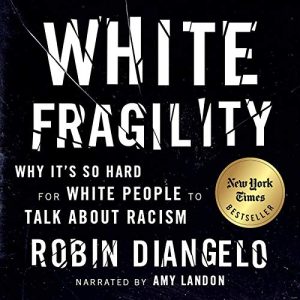White Fragility Audiobook: Unmasking the Invisible Tethers of Privilege
It was a brisk autumn morning when I hit play on White Fragility Audiobook. I had just brewed my second cup of coffee, its warmth contrasting the chill creeping through my apartment. The world outside my window was painted in shades of amber and crimson, yet inside, I felt a storm brewing – a quiet readiness to confront uncomfortable truths. As Amy Landon’s voice emerged through my headphones, I sensed that this journey would not be one of passive listening but an unflinching self-examination. Little did I know how profoundly this audiobook would challenge my assumptions and reshape my understanding of the invisible scaffolding upholding racial inequality.
Dr. Robin DiAngelo’s White Fragility is not merely a book; it’s a mirror held up to the soul of white America, reflecting uncomfortable realities many prefer to ignore. As someone who has always considered himself progressive and empathetic, I found myself wrestling with questions I hadn’t dared to ask before. The audiobook’s central premise – that white fragility serves as both a shield and a sword in maintaining systemic racism – unfolds with precision, clarity, and a depth that left me simultaneously enlightened and unsettled.
Amy Landon’s narration is nothing short of masterful. Her voice carries a calm yet firm cadence, perfectly complementing DiAngelo’s incisive prose. Landon doesn’t just read the text; she embodies it, lending weight to every argument and nuance to every example. Her tone is neither accusatory nor condescending but rather reflective – an invitation for listeners to join her in exploring the layers of privilege and defensiveness that permeate our social fabric.
What struck me most about this audiobook was its ability to articulate what so often goes unspoken or misunderstood. DiAngelo’s exploration of “white solidarity” hit me like a lightning bolt – this concept that white individuals unconsciously (or consciously) protect their own comfort at the expense of honest racial dialogue was something I had witnessed countless times but never named. It reminded me of moments in my own life where I had chosen silence over confrontation, mistaking passivity for allyship. That realization stung.
The chapter on “racial triggers for white people” was another turning point for me. DiAngelo dissects the defensive reactions – anger, guilt, denial – that often arise when white people are challenged on issues of race. Listening to this section felt like peeling back layers of an onion; with each layer came tears but also clarity. It forced me to confront how these reactions serve not only as barriers to personal growth but also as mechanisms that perpetuate inequality.
One of DiAngelo’s greatest strengths lies in her ability to weave personal anecdotes with broader sociological analysis. Her experiences as an antiracist educator ground the book in real-world contexts, making abstract concepts tangible and relatable. For instance, her recounting of workshops where participants bristled at terms like “white privilege” illuminated just how deeply ingrained these defensive patterns are – and how crucial it is to dismantle them.
Yet what makes White Fragility Audiobook truly transformative is its insistence on accountability without descending into shame or blame. DiAngelo does not weaponize guilt; instead, she frames discomfort as an essential step toward growth. This approach resonated deeply with me because it offered hope – a path forward rather than a wall to scale.
Amy Landon amplifies this message through her thoughtful narration, ensuring that even the most challenging sections feel approachable rather than alienating. Her voice became a steady guide through terrain that was often emotionally fraught but always illuminating.
By the time I reached the final chapter, I felt as though I had undergone a metamorphosis – not because I now had all the answers but because I had learned to ask better questions. How do we move beyond performative allyship? How do we create spaces where vulnerability can coexist with accountability? These are questions I will carry with me long after finishing this audiobook.
For those hesitant about diving into White Fragility Audiobook, let me assure you: this is not a book designed to shame or berate. It is an invitation – a call to examine the water we swim in and consider how we might purify it for future generations. Whether you’re new to conversations about race or have been engaging with them for years, this audiobook offers invaluable insights that will challenge and inspire you in equal measure.
If you’re ready to embark on this transformative journey, you can freely download White Fragility Audiobook at Audiobooks4soul.com – a resource that ensures accessibility for all who wish to listen.
As I closed this chapter of introspection and stepped back into my day-to-day life, one thing became clear: growth begins where comfort ends. And while this audiobook may shatter some illusions along the way, it also plants seeds – seeds of awareness, empathy, and action – that have the potential to bloom into meaningful change.
Looking forward to our next foray into storyscapes together! Until then, happy listening.
Warm regards,
Stephen











